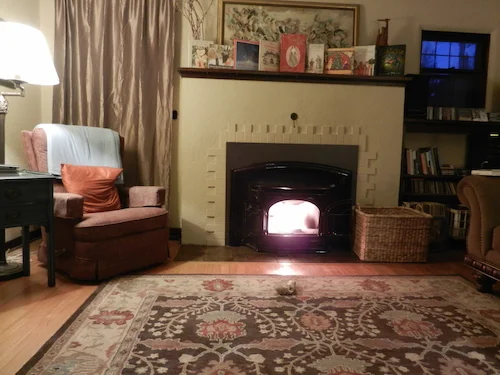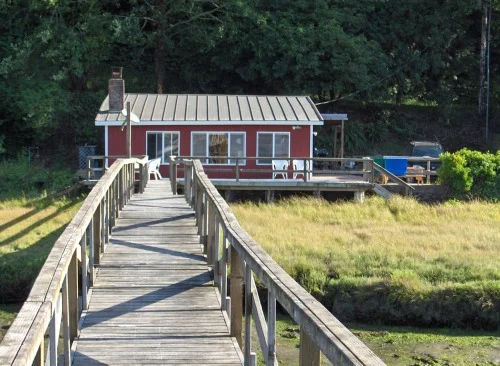Twenty years ago this past summer I traveled to the land of my ancestors. A land I had heard about my whole life, a storybook country of lakes and forests and flaxen-haired princesses. Of blue and yellow flags and three golden crowns atop many a spire. It was “the old country” of my grandparents on both maternal and paternal sides. Surnames like Lundberg, Holmberg, Appelquist, Boquist, and Engwall wrapped my childhood in their soft sing-song melodies. And I was one small variation on that theme, about to join the main chorus.
In the Name of the Father
I did not know then nor do I know now the full nature of God. No one does, but we’re given glimpses through the revelation of nature, the testament of history and its saints, and especially through the ordinary people who love us and mark our days. As a child my earthly father represented whatever goodness, safety, and unconditional love there was to be found in this world. And that has everything to do with why I call myself a Christian today, and can still refer to God as Father, problematic though it may be for me as a 21st-century woman.
Find the Good and Praise It
Like it or not, I have been fine-tuned since childhood to feel the weight of the world’s woes more than most, perhaps like you who read the Art House America Blog (or write for it). Luci Shaw calls it the poet’s curse, this heightened sensitivity to life’s joys and sorrows. We can’t not feel what we feel. I couldn’t agree more and yet the nagging question for me comes down to this: how do we find the good and praise it in the midst of so much suffering? How do we flesh out our callings with lives of deep joy and courage? These questions haunt me year after year. I can’t promise much in the way of satisfying answers, only glimmers, a semblance of peace.
Summer Lake
But Summer Lake offers me something neither of those places ever can — the expanse of wilderness. Every day we surround ourselves with manmade structures and agendas and priorities set by us, the human beings. When you venture into those wetlands you are reminded again that an entire world happens out there without you, every day, every season of the year. Staggering, beautiful, abundant life. The peace of wild things.
Epiphany
It is hard to come here and not feel guilty. So I come bearing gifts: a bag of navel oranges and three pairs of warm socks (from my overstuffed drawer, yes, but clean and only slightly worn). In the morning they will all be snatched up, along with half of the oranges. Meanwhile, I stand outside in the dark and drizzle under the lamplight, waiting to be let in. My pillow’s stuffed in a white trash bag as deep blue splats form on my sleeping bag. It’s 11:00 p.m., January 6.
There are only four women staying at the shelter tonight, Maria tells me. Should be pretty quiet.
With Bread
Company. Campaign. Champagne. Champion. Companion. Familiar words that sound so alike because they all spring from the same medieval French and Latin roots. “Com” = “with” and “Pan” = “bread.” “Camp” (champ) = “open country or field.” These words are cousins in etymology and function. To be a companion is literally to share bread with someone. To share bread with someone is to keep their good company. To keep their good company is to be their champion. And to be their champion is to be their defender, to walk among them and eat with them.
The Zen of Seeing
So rather than read further, which would’ve been much easier, I decided to take the ballpoint pen and lined notebook paper and draw what was right before me — and do it quickly, without proper paper or the need to prettify my work. I did opt for color because the green was so lush and bright with the afternoon sunlight shining through the leaves, so I found a couple of green markers and sat there in the sun happily coloring away, like I often did as a child. Did I capture the head of Romaine perfectly? Not at all. But did I begin to glimpse its infinite beauty, the curtain of one leaf folded inside another, the veins like tiny circuitry? I did, indeed.
Beginnings
I am learning to be more comfortable with uncertainty. I believe mercy hides everywhere in the world, waiting to swoop in and hold us. We cannot control much, but we can still live deep and meaningful lives. We can attend to the work of our hands and embrace our small yet worthy part in practicing resurrection. Remembering that we are forever beginners, never experts, at love.
April in Paris
My mother adored Daddy, as she called him, but she swooned for Ravel. Family legend has it that a recording of Ravel’s best known piece, Bolero, which somehow turned up in my mother’s possessions when in high school, was promptly destroyed, being deemed far too sensuous for the impressionable oldest daughter of a Swedish Baptist preacher. And she could painfully recall not being able to attend a friend’s birthday party as a child in Pasadena, because the planned activity for the group was to see a movie — a novel, rare treat in 1930. The first time I saw the film Babette’s Feast, I had some inkling of the dilemma my mother’s upbringing must have wrought in her blossoming creative life, as it would later in mine.
Tangled Up in Green
Pulling English Ivy is back-breaking work. . . . You are sweaty, thirsty, and exhausted. You use words not part of your common vocabulary. You want to scream. You want to give up. You look back at the sailboat rounding the bend, the stars and stripes flapping in the breeze. WHY are we doing this?
Of Silence, Wildness, and Saint Ignatius
To get there you must first drive an hour and a half northwest toward the ocean, then meander through a national wildlife sanctuary (with a band of donkeys wandering the hillsides) until you can’t go any farther. All along the way, you’re slowly enveloped by a web of forest and fog, mist and mystery. You must trust that the circuitous gravel road does indeed lead somewhere . . .
The Gift
The young woman sitting next to me in the Denver airport gripped the grande cup of hot Earl Grey I had just purchased for her. Her name was Marta. She was seventeen, an exchange student from the Ukraine on her way back to Eugene, Oregon, for a few days of debriefing before heading home. She had spent the last year of high school with a host family in Minneapolis where I’d just attended a conference. Her wide brown eyes and long, thin legs gave her the look of a fawn — a frightened, waif-like creature. She also had a nasty cold that I did not want to catch.


























